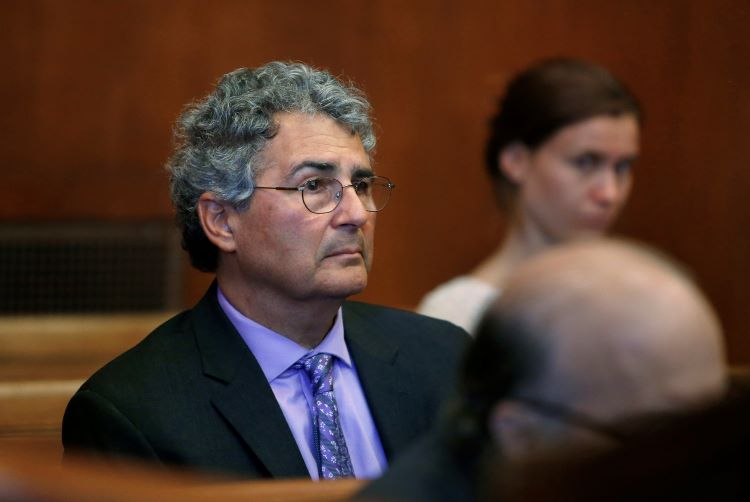Physician-assisted suicide is not protected by Massachusetts Constitution, top state court rules
 Dr. Roger Kligler sits during a hearing in March 2017 in Cambridge, Massachusetts. The Massachusetts Supreme Judicial Court ruled Dec. 19 that allowing doctors to prescribe a lethal dose of medication to mentally competent patients with terminal illnesses is not protected by the state constitution. Photo by Jessica Rinaldi/The Boston Globe via the Associated Press.
Dr. Roger Kligler sits during a hearing in March 2017 in Cambridge, Massachusetts. The Massachusetts Supreme Judicial Court ruled Dec. 19 that allowing doctors to prescribe a lethal dose of medication to mentally competent patients with terminal illnesses is not protected by the state constitution. Photo by Jessica Rinaldi/The Boston Globe via the Associated Press.
The Massachusetts Declaration of Rights does not provide a due process or equal protection right to physician-assisted suicide for terminally ill patients, the Massachusetts Supreme Judicial Court ruled Monday.
In a Dec. 19 decision, the court also rejected arguments that the manslaughter law would be unconstitutionally vague if applied to physicians prescribing life-ending medication.
The Massachusetts Supreme Judicial Court pointed out that physician-assisted suicide has been legalized by 10 states and the District of Columbia. In Massachusetts, however, voters rejected a proposed ballot initiative in 2012 that would have allowed physicians to provide life-ending medication to competent, terminally ill patients. The state legislature has also failed to advance bills that would permit the practice.
“The desirability and practicality of physician-assisted suicide raises not only weighty philosophical questions about the nature of life and death but also difficult technical questions about the regulation of the medical field,” the court said. “These questions are best left to the democratic process, where their resolution can be informed by robust public debate and thoughtful research by experts in the field.”
The Massachusetts Supreme Judicial Court ruled in a case filed by retired physician Dr. Roger Kligler, who has been diagnosed with stage 4 metastatic prostate cancer, and physician Dr. Alan Steinbach, who would like to provide physician-assisted suicide to patients nearing the end of life.
Kligler said he would like to pursue physician-assisted suicide if he receives a six-month prognosis. He has been diagnosed with stage 4 metastatic prostate cancer, but the disease “currently has been contained,” the court said.
The court said Kligler’s complaint should have been dismissed because he isn’t at a point where he would like to pursue physician-assisted suicide. The court went on, however, to rule on Steinbach’s claims.
Looking to history, the Massachusetts Supreme Judicial Court, said suicide has long been discouraged, and assisting suicide has largely been considered a serious crime.
The court then considered the “arc of precedent” and found that it doesn’t support physician-assisted suicide. While courts have found a right to decline medical treatment, none has found privacy protections protecting that right extend to physician-assisted suicide, the court said.
Hat tip to Reuters and the Associated Press, which has coverage of the decision.



